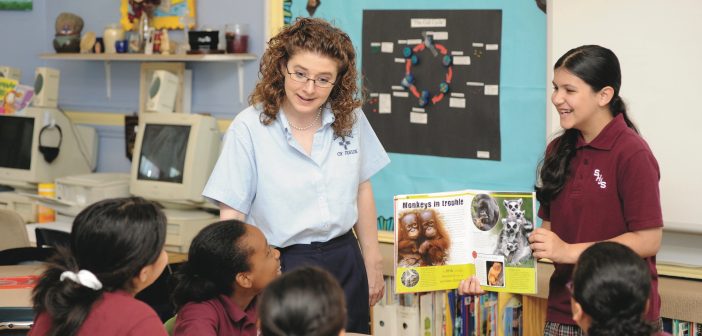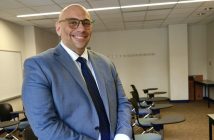Through GSE’s Center for Catholic School Leadership and Faith-Based Education, students employed as full-time professionals in faith-based non-public schools can receive a 40 to 50 percent tuition discount for up to six credits each semester.
“From 2010 to the spring of 2019, over 1,200 students have benefited,” said Cristiana Ritchie-Carter, associate director of the Center. “Not just across New York City—all around us.”
The scholarship program, which developed through long-standing relationships with the Catholic community, continues to help teachers, principals, superintendents, counselors, bishops, and professors from almost every continent, Ritchie-Carter said. Perhaps more importantly, it has made master’s and Ph.D. programs more affordable for full-time educators.
Cutting Costs for Teachers of Students at Risk
Such is the case for teachers at Cornelia Connelly Middle School of the Holy Child, an independent Catholic school for at-risk girls across New York City. The school serves almost 100 low-income students whose average household income amounts to $26,742. In the 2017-18 school year, the school paid $16,415 for each student’s education, while families paid only $660. That means their teachers don’t earn as much as public school teachers in a suburban setting, said the school’s principal.
“What I’m able to offer our staff is not necessarily comparable even to the public school model,” said Shalonda Neeley Gutierrez, FCRH ’96, the school’s principal. “Fordham’s partnership with the 40 percent-off tuition really opens up the doors for our teachers.”
One of those educators is Emma Linsenmeyer, GSE ’20, a fifth-grade teacher at the middle school.
“When I was looking at different programs, Fordham stood out to me because of this opportunity,” said Linsenmeyer, who studies general and special education at Fordham. “There was nowhere else [in New York City]that was offering that kind of benefit to teachers in my position.”
One of her colleagues, Katherine Hager, GSE ’18, said the scholarship saved her almost $20,000 in tuition over a two-year span. Hager, a fourth-grade teacher who received her master’s degree in childhood literacy, said her Fordham education has also taught her how to tailor her content to her young students.
“My time at Fordham really enabled me to take time to reflect on my teaching and my practice that I had done prior to Fordham, and decide how I could change it to be more culturally relevant and relatable for my students,” she said.
Her classroom currently has 18 girls: the majority of them Latina and the first in their families to potentially graduate from college. Thanks to her professors at Fordham, Hager said, she made sure her students had access to books like “Drum Dream Girl”—a story about a Cuban girl named Millo Castro Zaldarriaga—that they could relate to.
“I made it an effort of mine to be sure that the students were reading books where they were seeing themselves in the characters, and they could connect to what they were reading in a way that was close to home,” Hager explained.
Returning to Jesuit Roots
Another alumna who benefited from both the scholarship and a Fordham education is Noelle Beale, Ph.D., GSE ’12, regional superintendent for the Catholic schools of Central Westchester and adjunct professor at GSE.
Student loans can snowball as time passes, particularly for those who pursue postgraduate degrees, Beale said. Thanks to the GSE tuition discount, she was able to avoid borrowing money for her doctorate degree.
“By the time you get to pursuing a doctorate, you have undergraduate expenses. You have graduate expenses. And so to then add doctoral expenses would be a very significant amount of money,” said Beale, who earned a doctorate in educational leadership, administration, and policy from Fordham. “If I had to have paid the entire tuition out of pocket, I likely would have needed to incur some student loan debt.”
Her Fordham education has also redefined her role as an administrator. She now navigates student discipline issues in a more holistic way, she said. The same applies to the way she speaks with students and staff.
“The way in which I view things,” said Beale, who also received her bachelor’s degree from Fordham College at Rose Hill, “is very much about that concept of the whole person: that we educate body, mind, and soul.”



